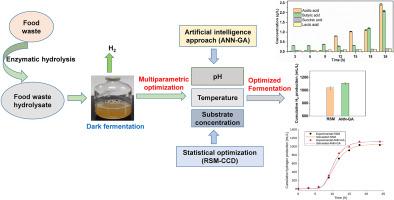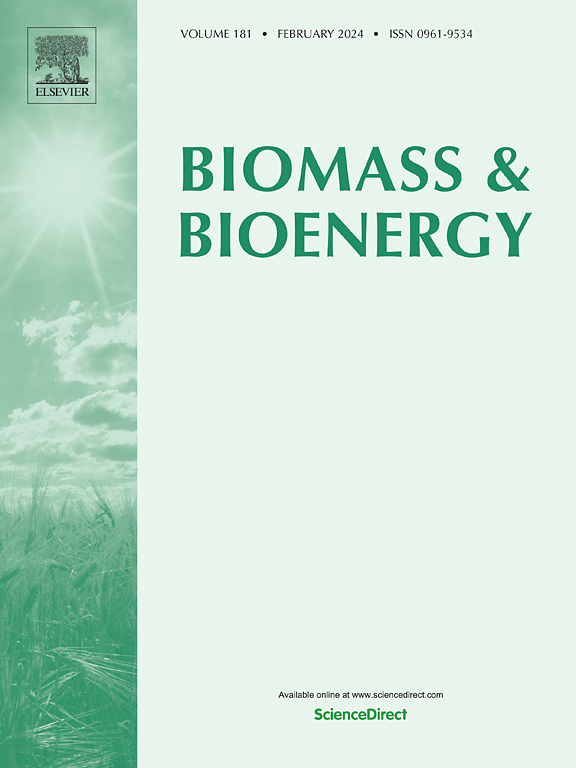Biohydrogen synthesis from food waste hydrolysate: Optimization using statistical design of experiments (DoE) and artificial neural network (ANN)
IF 5.8
2区 生物学
Q1 AGRICULTURAL ENGINEERING
引用次数: 0
Abstract
Dark fermentation is an eco-friendly route for producing hydrogen, a clean next-generation fuel. The present study reports valorization of food waste to biohydrogen (bioH2) through dark fermentation using Clostridium pasteurianum. The optimization of fermentation parameters using response surface methodology (RSM) with central composite design (CCD) resulted in bioH2 yield = 1039 mL/L (1.58 mol/mol hexose sugars) for the conditions: pH = 6.5, temperature = 36 °C, TRS concentration = 10 g/L. An artificial neural network coupled with a genetic algorithm (ANN-GA) predicted the optimum parameter set as pH = 6.7, temperature = 36.8 °C, TRS concentration = 10.85 g/L. A bioH2 yield of 1108 mL/L (1.73 mol/mol hexose sugar) was obtained for these conditions. The modified Gompertz model revealed a maximum bioH2 production rate of 185.34 mL/L·h for ANN-GA conditions as compared to 153.74 mL/L·h for RSM-CCD predicted conditions. Fermentation at ANN-GA-predicted conditions revealed greater shift of metabolic intermediates towards acetic acid/butyric acid pathway, resulting in higher bioH2 production. The ratio of acetic to butyric acid increased from 0.9 to 0.94, indicating metabolic shift favoring bioH2 production. These results demonstrate superiority of ANN-GA technique for simulating behavior of a non-linear system like the metabolic pathway of C. pasteurianum.

利用食物垃圾水解物合成生物氢:利用统计实验设计(DoE)和人工神经网络(ANN)进行优化
暗发酵是生产氢这种清洁的下一代燃料的一种生态友好型途径。本研究报告利用巴氏梭菌通过暗发酵将食物垃圾转化为生物氢(bioH2)。在 pH = 6.5、温度 = 36 °C、TRS 浓度 = 10 g/L 的条件下,利用响应面方法学(RSM)和中央复合设计(CCD)对发酵参数进行了优化,得出生物氢产量 = 1039 mL/L(1.58 摩尔/摩尔己糖糖)。人工神经网络结合遗传算法(ANN-GA)预测的最佳参数设置为 pH = 6.7,温度 = 36.8 °C,TRS 浓度 = 10.85 克/升。在这些条件下,生物 H2 产量为 1108 mL/L(1.73 摩尔/摩尔己糖糖)。修改后的 Gompertz 模型显示,ANN-GA 条件下生物 H2 的最大生产率为 185.34 mL/L-h,而 RSM-CCD 预测条件下为 153.74 mL/L-h。在 ANN-GA 预测条件下发酵,代谢中间产物更多地转向乙酸/丁酸途径,从而产生更高的生物二氧化氢。乙酸与丁酸的比率从 0.9 增加到 0.94,表明代谢转变有利于生物 H2 的产生。这些结果表明,ANN-GA 技术在模拟巴氏菌代谢途径等非线性系统行为方面具有优越性。
本文章由计算机程序翻译,如有差异,请以英文原文为准。
求助全文
约1分钟内获得全文
求助全文
来源期刊

Biomass & Bioenergy
工程技术-能源与燃料
CiteScore
11.50
自引率
3.30%
发文量
258
审稿时长
60 days
期刊介绍:
Biomass & Bioenergy is an international journal publishing original research papers and short communications, review articles and case studies on biological resources, chemical and biological processes, and biomass products for new renewable sources of energy and materials.
The scope of the journal extends to the environmental, management and economic aspects of biomass and bioenergy.
Key areas covered by the journal:
• Biomass: sources, energy crop production processes, genetic improvements, composition. Please note that research on these biomass subjects must be linked directly to bioenergy generation.
• Biological Residues: residues/rests from agricultural production, forestry and plantations (palm, sugar etc), processing industries, and municipal sources (MSW). Papers on the use of biomass residues through innovative processes/technological novelty and/or consideration of feedstock/system sustainability (or unsustainability) are welcomed. However waste treatment processes and pollution control or mitigation which are only tangentially related to bioenergy are not in the scope of the journal, as they are more suited to publications in the environmental arena. Papers that describe conventional waste streams (ie well described in existing literature) that do not empirically address ''new'' added value from the process are not suitable for submission to the journal.
• Bioenergy Processes: fermentations, thermochemical conversions, liquid and gaseous fuels, and petrochemical substitutes
• Bioenergy Utilization: direct combustion, gasification, electricity production, chemical processes, and by-product remediation
• Biomass and the Environment: carbon cycle, the net energy efficiency of bioenergy systems, assessment of sustainability, and biodiversity issues.
 求助内容:
求助内容: 应助结果提醒方式:
应助结果提醒方式:


